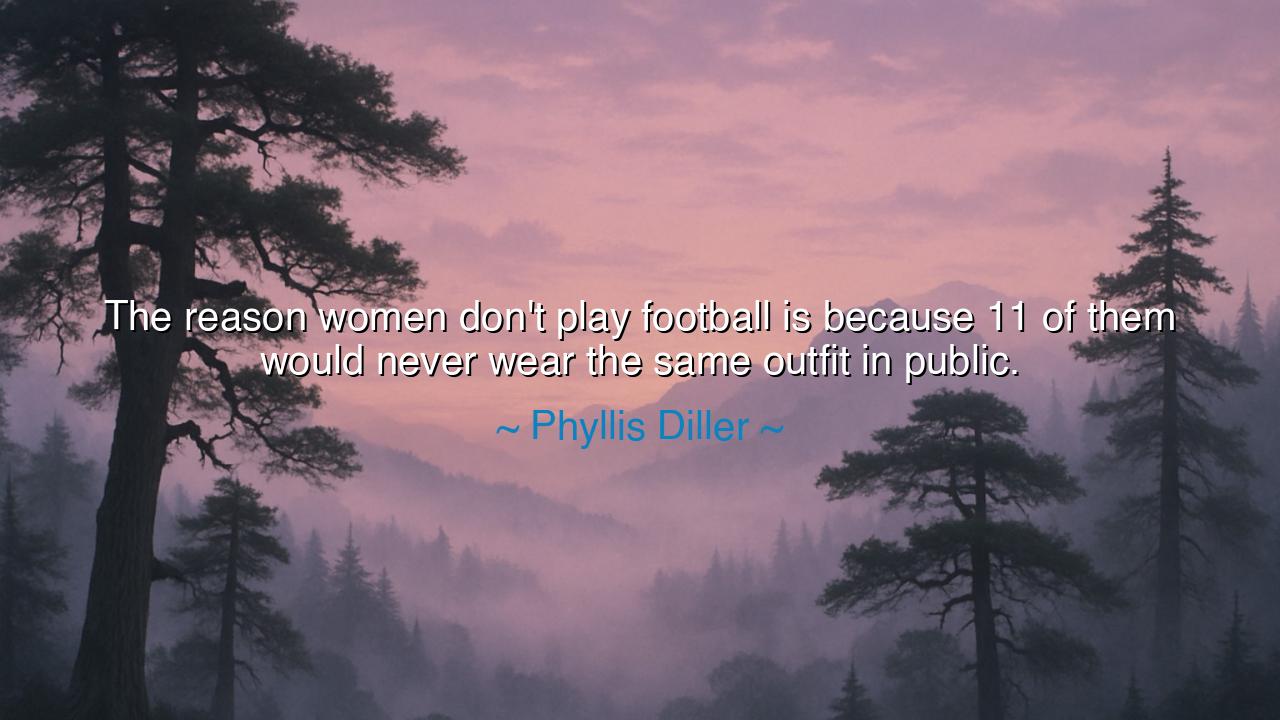
The reason women don't play football is because 11 of them would
The reason women don't play football is because 11 of them would never wear the same outfit in public.






Hear the playful yet piercing words of Phyllis Diller, the trailblazing comedienne who cloaked wisdom in laughter: “The reason women don’t play football is because 11 of them would never wear the same outfit in public.” At first, these words sparkle with humor, drawing upon the old jest that women are bound by vanity or fashion. Yet beneath the jest lies a subtle strike at the way society has long painted women, not as warriors or leaders, but as ornaments—judged more for their clothing than for their courage, more for their appearance than for their strength. Diller, with wit as her sword, both plays into and undermines this stereotype, reminding us of the absurdity of such narrow visions.
The origin of this quip lies in Diller’s career as a woman who dared to make her way in a world dominated by men. Comedy, like football, was a rough and unforgiving arena, and Diller entered it with armor of laughter. In her age, women were expected to be graceful, quiet, and refined—not loud, sharp, and unafraid to mock the sacred. By joking about outfits and football, she points to the ridiculousness of reducing women’s worth to the trivial, even as she uses that triviality to carve her place in the public imagination.
History offers us parallels. Consider Artemisia I of Caria, a woman who in the 5th century BCE commanded ships in the navy of Xerxes during the Persian Wars. She was no delicate flower concerned with garments; she was a strategist who struck fear into her enemies. Yet when chroniclers spoke of her, they often mentioned her gender more than her genius, as though the marvel was not her deeds but her femininity in a man’s world. Diller, centuries later, faced the same shadow: to succeed, she turned the very stereotypes of women into the material of her triumph.
The heart of the joke rests in the contrast: men are seen as warriors who unite in uniform to conquer the field, while women, bound by society’s gaze, are imagined as incapable of such unity because of fashion. But in making light of this, Diller shines a mirror on the audience. For if society truly believes women could not unite, is that not a deeper folly? Her laughter masks a lesson: do not confuse cultural expectations with truth. Women, like men, are capable of courage, unity, and greatness—but they have been too long judged by standards that measure only the surface.
Thus, the meaning is twofold. On the surface, it is comedy—a jab at women’s supposed obsession with appearance. At its core, it is rebellion: by joking about it, Diller exposes the absurdity of the stereotype. For women do indeed “wear the same outfit” when they march together, whether in uniforms of war, in robes of protest, or in the shared garb of dignity. The joke is a mask, and behind it lies both satire and truth.
The lesson is that humor can be a weapon as sharp as any sword. Where direct defiance may have been silenced, laughter can slip through the cracks of prejudice and plant seeds of reflection. Diller teaches us that by exaggerating stereotypes, we reveal their foolishness. And more deeply still, she reminds us that unity is not hindered by fashion or appearance, but by the false beliefs that society clings to.
Practically, this means we must learn to use humor not only to entertain but to challenge. When faced with a stereotype, mock it, twist it, and reveal its emptiness. Do not let the world define you by shallow measures. Unite with others in shared purpose, not in uniformity of dress or custom, but in the deeper uniformity of courage, justice, and truth.
So let us take Phyllis Diller’s jest to heart. “The reason women don’t play football is because 11 of them would never wear the same outfit in public.” What begins as laughter ends as a lesson: women, and all people, are greater than the shallow labels placed upon them. In unity, they can play any game, fight any battle, and win any crown—not because of what they wear, but because of who they are.






NMTran Thao Nguyen Mai
I think Phyllis Diller’s joke about women not playing football because of outfits is a clever way of using humor to address broader gender expectations. But is there a more serious message here about how societal pressures influence women’s participation in certain activities? How often do we dismiss women’s interests or capabilities in areas like sports due to these kinds of assumptions?
DTvan dong tran
While Phyllis Diller’s quote is undeniably funny, it also brings to light a certain expectation for women to prioritize appearance over practicality, even in sports. Why is it assumed that women would care more about their outfits than their athletic abilities? Could this be a commentary on how women are often seen through the lens of fashion rather than skill in many domains?
BTBang Tran
I understand that Phyllis Diller’s comment is meant to be a joke, but it also highlights how society has traditionally divided activities like sports along gendered lines. Is there an underlying message that women aren't as 'serious' about sports because of fashion concerns? How much of this perception is rooted in actual attitudes, and how much is just cultural conditioning?
KKhanh
Phyllis Diller’s quote is a humorous take on gender and sports, but it also plays into the stereotype that women are overly concerned with appearances. Does this imply that women’s interests in sports are secondary to fashion? Or is she simply poking fun at how society views femininity? It makes me wonder if humor like this reinforces or challenges gender norms in sports.